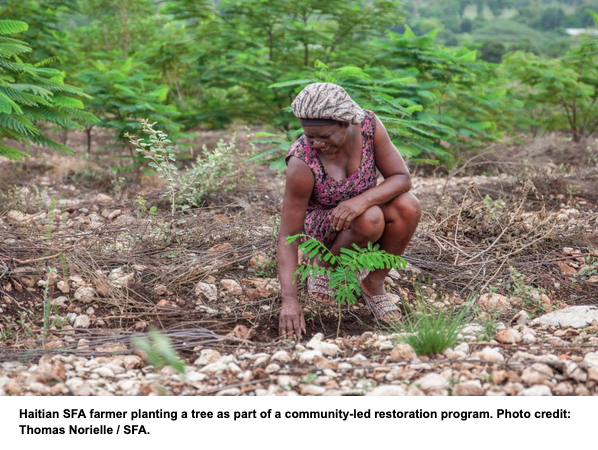According to Dr. Thomas Crowther, professor of ecology at the Swiss university ETH Zurich, we seem to being planting trees the right way in Haiti. He is the senior author of a new study published yesterday which suggests that effective forest restoration should be driven by local communities that choose to work in concert with nature to help themselves. Full disclosure: the Smallholder Farmers Alliance was not cited, but that is exactly what we do.
| Thousands of SFA Haitian farmers are working with nature to help themselves… and the planet. Specifically, our farmer-members grow, transplant and look after trees in order to earn the seed, tools, training and other agricultural services that help them achieve higher crop yields and increased household incomes. And it is the farmers themselves, with guidance from SFA agronomists, who manage both the tree planting and the agricultural services.
SFA farmers have planted close to 11 million trees in Haiti since 2010. On Monday a team involving hundreds of international scientists, led by Dr. Crowther, published a new study in the journal Nature suggesting that restoring global forests can potentially capture the equivalent of one third of all human-generated carbon released since the beginning of the Industrial Era. While there is general agreement among scientists about the critical importance of forest conservation and tree planting, when it gets down to specifics there is a scientific uproar that centers on two numbers: 205 and 226. This new study that sets 226 gigatons of carbon (the one third referred to above) as the potential amount that could be captured by forest restoration. However, Dr. Crowther was also the senior author of a similar study released in 2019 that proposed this estimate to be 205 gigatons. The earlier study resulted in a boom in tree planting along with considerable controversy regarding how that number was reached. The new study incorporates several changes in methodology, but there is still likely to be a chorus of dissenters. Meanwhile in Haiti we have been planting trees as part of a continuous uninterrupted agroforestry program from 2010 up to the present day, in spite of the gang violence that has gripped the capital of Port-au-Prince and other urban areas in recent years. A final note: while it is a small thing in light of all that Haiti is suffering at the moment, we invite you to check out our cool new website Regards, |
|

